News
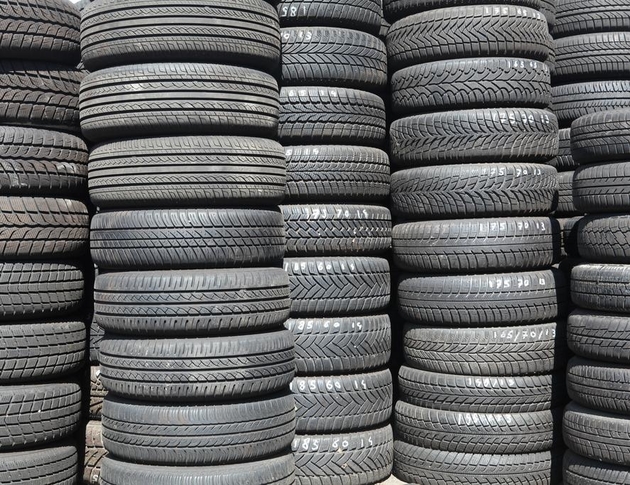
Sri Lanka on the cusp of a severe tyre shortage issue
Sri Lanka will be facing a tyre shortage soon as a result of the prevailing restrictions on imports imposed by the government to promote import substitution and prevent foreign exchange out flows, several tyre dealers, traders and buyers complained.
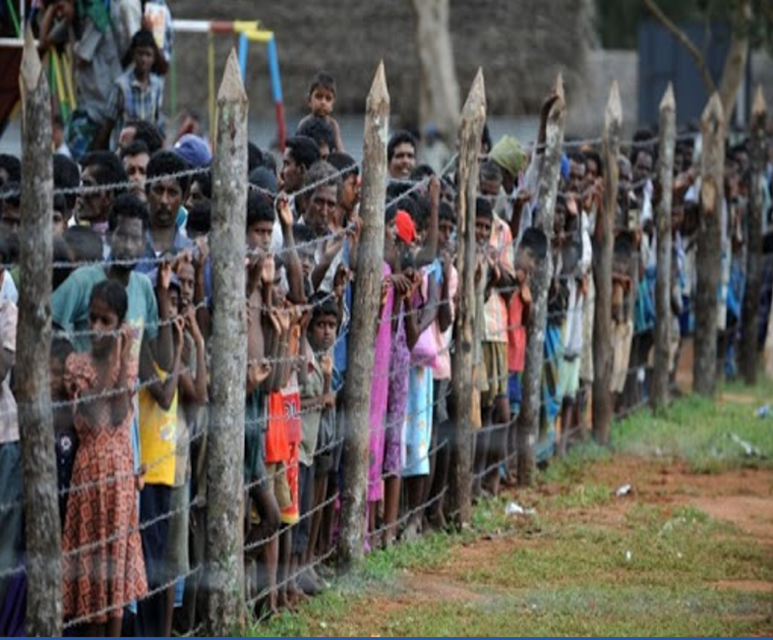
India's position on the full implementation of 13A unchanged
The Indian government has reiterated its position on the “full implementation” of the 13th amendment, amidst moves to introduce a new amendment.

All MPs should cast aside their personal agendas and work for a new constitution: PM
Prime Minister Mahinda Rajapaksa yesterday (25) called on the first time parliamentarians to cast aside their personal and political agendas and support the passage of the proposed new Constitution.
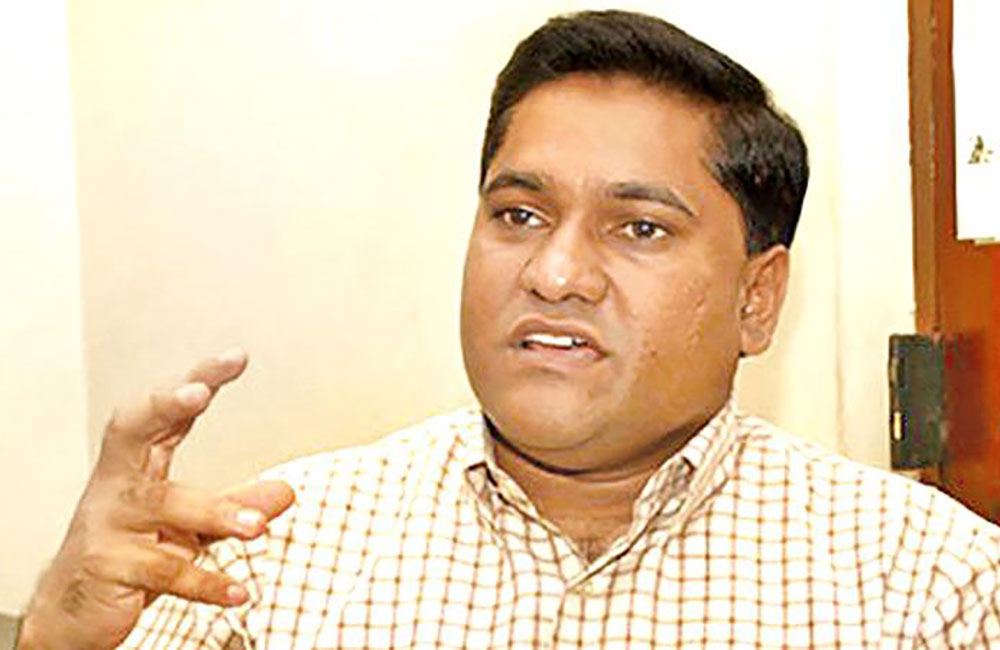
Independent commissions must remain even if 19A is abolished - Vijitha
Opposition parliamentarians continue to push to retain the independent commissions in the midst of government plans to abolish the 19th Amendment to the Constitution. JVP MP Vijitha Herath said that independent commissions should be retained although the 19th Amendment is to be abolished.
He observed that the 19th Amendment managed to reduce to an extent the limitless powers vested with the executive presidency.
He explained that it was the independent Elections Commission that ensured the holding of a free and fair election.
According to Herath, the independent commissions should be retained in the proposed new constitutional amendment.
Meanwhile, Chief Opposition Whip Lakshman Kiriella also noted that the independent commissions should be continued with and that the government should give a clear response on the matter.
He further noted that present members of the government had supported the 19th Amendment to the Constitution since it was passed in parliament with 223 voting in favour.
"Amendments proposed by them were also included in the 19th Amendment. Why the sudden change of heart," he questioned.
However, Co-Cabinet Spokesperson, Minister Udaya Gamanpila said that independent commissions will be retained in the proposed new constitutional amendment albeit with some changes.
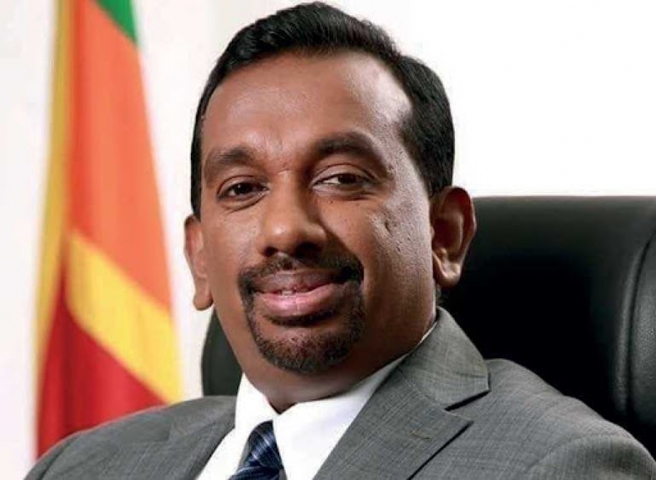
President appoints Mahindananda as his representative for CC
President Gotabaya Rajapaksa has appointed Agriculture Minister Mahindananda Aluthgamage as his representative to the parliamentary Constitutional Council.
Minister Aluthgamage when inquired confirmed the appointment.
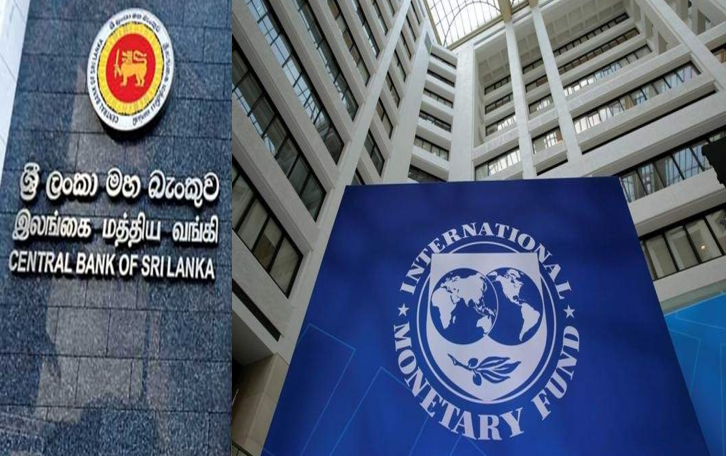
Sri Lanka pushes into uncertainty in continuing IMF programme
Sri Lanka is on the verge of uncertainty in continuing the IMF programme that would also unlock substantial multilateral and bilateral financing (possibly debt relief as well), increasing the prospects of improving the sovereign rating.

Rate cut exerts very little stimulus for investors but big impact on savers
Sri Lanka’s expectation of encouraging borrowings by lowering interest rates as a key tool to stimulate the economy during the COVID-19 crisis period has very little impact on spending and investment, several economic analysts and bankers said. Low interest rates cannot rescue Sri Lanka in the present stage of economic calamity; they simply cause the money to flow to people who have other interests in the system, eminent economic analyst and former Central Bank (CB) Deputy Governor W.A Wijewardena told the Business Times.
Economic rehabilitation requires the country to use its human, physical and knowledge capital for enhanced production, he pointed out adding that cheap money or flooding the economy with credit will not help the country to attain that goal.
As it is, the Central Bank has to go for further reduction in interest rates to discourage banks from parking their excess money amounting to about Rs. 160 billion with the CB; that will be suicidal because savers will not get enough remuneration for their efforts, he added.
In that way, more problems are being created for the economy and the current low interest rate regime should be managed properly, Mr Wijewardena said stressing that there were no further possibilities for interest rate cuts in the economy.
On the other hand, commercial banks and non-bank financial institutions have not responded promptly in passing the benefit of interest rate reductions.
Banks have equated monthly installments of borrowers, and also make it difficult to take new loans by not easing restrictions, several bank customers complained.
One-year fixed deposit rates fell to 5.5 per cent currently from 11.5 per cent in December 2019 and one-year Treasury bill rate fell to 4.8 from around 8.5 per cent
Providing a relief to borrowers, the average prime lending rate of commercial banks fell to 7.4 per cent from 9.7 per cent.
However, the lowering of interest rates has pushed three million depositors and their seven million dependants in great difficulties.
The interest rate in Sri Lanka is determined by the demand for credit, the excess of deposits and inflation, former senior banker and economic analyst S.A.P. Suriyapperuma told the Business Times.
The CB’s Monetary Board also sets interest rates with the aim of raising Sri Lanka’s savings rate, which has been a public policy for nearly 50 years.
As a result of these policies, Sri Lanka’s savings have increased to 26 per cent from 18 per cent over the past 30 years, he revealed, adding that after the loan interest rate was set between 4 and 11 per cent, the banks immediately brought down the deposit rate to 5 per cent.
Low interest loans should be made available to investors and businessmen. But the provision of refinancing facilities on state intervention should be made through funds obtained from foreign funds and innocent depositors should not be held captive for this purpose, he pointed out. (Bandula Sirimanna)
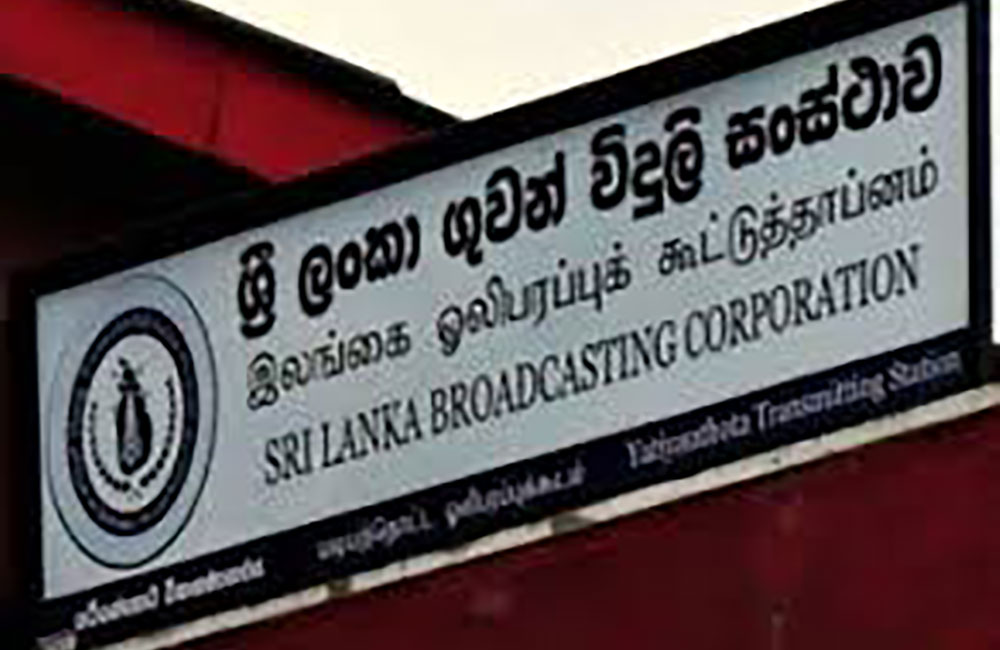
SLBC blatantly violates election laws
During the silent period where no election propaganda was to take place, the Muslim Service of SLBC had carried a voice cut by SLPP Beruwala organiser, Marjan Faleel urging the voters to support SLPP Kurunegala candidate Mahinda Rajapaksa.
CaFFE pointed out that this was also a misuse of public property. This is not the first time that the SLBC had violated election laws and CaFFE had lodged similar complaints to the Commission earlier.
CaFFE has also received a number of complaints about propaganda during the silent period. These include promoting candidates at religious establishments as well as distributing goods to voters.
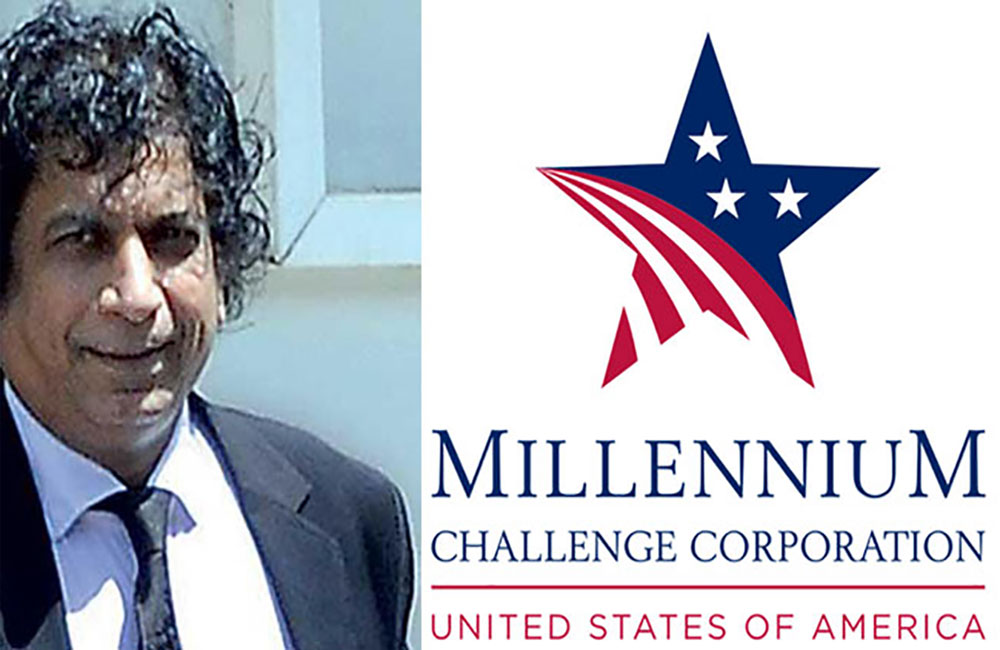
MCC's Sri Lanka office confirms authenticity of AG's letter
The Millennium Challenge Corporation’s (MCC) Sri Lankan office confirmed to The Sunday Morning the authenticity of then Attorney General (AG) Jayantha Jayasuriya’s letter in 2018, which resurfaced recently causing fresh controversy. MCC Country Director Jenner Edleman affirmed that such a letter was received by the MCC.
“The letter is legitimate but I do not want to speak further on this to the press,” Edelman told The Sunday Morning on Friday (21). The letter by the then AG appeared to be in favour of the MCC Compact being implemented in Sri Lanka.
“Having gleaned through the proposed Millennium Challenge (Corporation) Compact, the draft Programme Implementation Agreement (PIA), as well as the Points of Discussion (without prejudice) between the negotiating parties which has been made available to me, I wish at the very onset (to) opine that no existing laws of Sri Lanka’s inhibits the Compact and the PIA (from) being implemented in Sri Lanka,” the letter sent by the department said.
However, one amendment to the agreement had been requested by the former AG in the letter.
“Thus, I am of the view that the passage of the said enactment by Parliament would result in the Compact and PIA, having parity of status of a domestic law in Sri Lanka. In the context of the above, it is requisite that Section 7.1 of the Compact referring to the provisions on Entry into Force, would be revised with the deletion of the sentence pertaining to the Compact prevailing over the domestic laws of Sri Lanka.”
Meanwhile, the MCC Compact agreement is currently under consideration and awaiting the observations of several state agencies, according to the AG, Co-ordinating Secretary of the AG State Counsel Nishara Jayaratne said, responding to a query by The Sunday Morning.
“We have called for several observations from several state agencies, so until we get these observations, we are not considering the matter. It’s under consideration,” she said.
When The Sunday Morning questioned Jayaratne as to whether current AG Dappula de Livera was of the same stance as his predecessor, she responded in the negative. (The Sunday Morning)
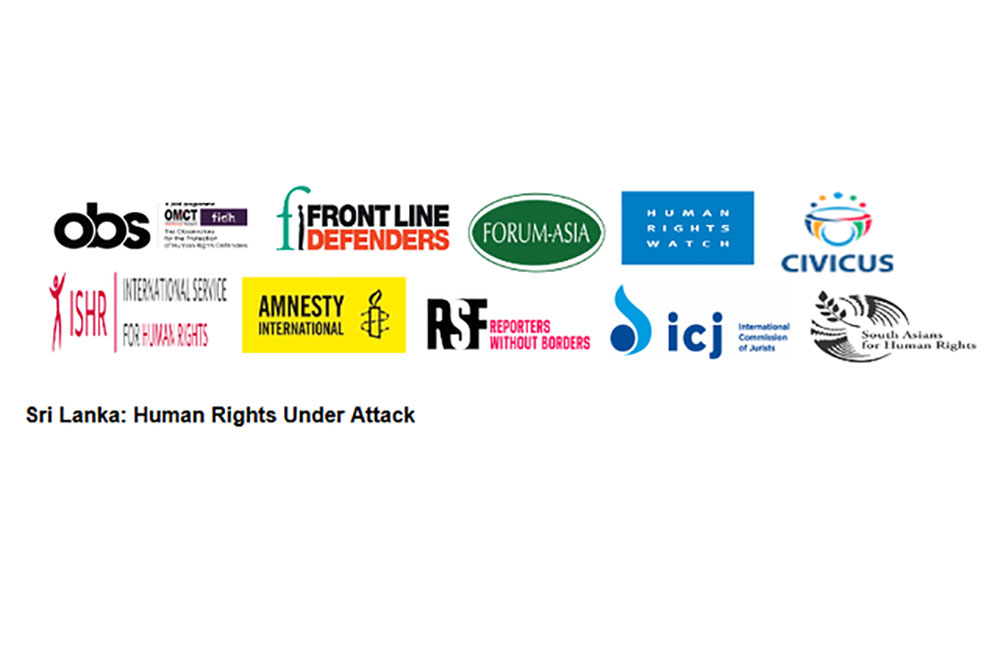
10 international organisations urge Govt. to end targeted crackdown on human rights defenders
The Sri Lankan government should end the targeted arrests, intimidation and threats against the lives and physical security of lawyers, activists, human rights defenders and journalists, 10 international human rights organisations said today.
The Sri Lankan government should end the targeted arrests, intimidation and threats against the lives and physical security of lawyers, activists, human rights defenders and journalists, 10 international human rights organisations said today.
They observed that a campaign of fear has intensified since the 2019 presidential election, and has cast a shadow over the 2020 parliamentary election campaign.
Human Rights Watch, Amnesty International, Reporters Without Borders, International Commission for Jurists, Forum-Asia, Frontline Defenders, CIVICUS, International Service for Human Rights, South Asians for Human Rights and OBS in a joint statement on Thursday (30) said that the United Nations, as well Sri Lanka’s partners and foreign donors, should immediately call for full respect, protection and fulfillment of the human rights of all Sri Lankans, and particularly to halt the reversal of fragile gains in the protection of human rights in recent years.
The statement further said;
Dissident voices and critics of the current government, including lawyers, journalists, human rights defenders and victims of past abuses, are being targeted by the police, intelligence agencies and pro-government media.
Since the presidential election in November 2019, anti-human rights rhetoric intended to restrict the space for civil society has been amplified by senior members of government. On 6 July 2020, at an election rally, Prime Minister Mahinda Rajapaksa stated that “NGOs will be taken into a special attention under the new government formed after the General Election, specifically, how foreign monies and grants are received to the NGOs from foreign countries and further, activities of the international organisations will be observed.” The government has also announced a probe into NGOs registered under the previous government.
In the months following the November 2019 presidential election, a number of organizations reported visits from intelligence officers who sought details of staff, programs and funding, in particular, organizations in the war-affected Northern and Eastern provinces of the country. Such visits are blatant attempts to harass and intimidate Sri Lankan civil society.
In February, the acting District Secretary in the Mullaitivu District (Northern Province) issued a directive that only non-governmental organizations with at least 70 percent of their activities focused on development would be allowed to work, effectively enabling arbitrary interference with and prevention of a broad range of human rights work. A Jaffna-based think-tank was visited several times, including soon after the Covid-19 lockdown, and questioned about its work, funding and staff details.
Lawyers taking on human rights cases have been targeted through legal and administrative processes and have faced smear campaigns in the media. Kumaravadivel Guruparan, a human rights lawyer, was a senior lecturer at the Faculty of Law at the University of Jaffna. He appeared as counsel on behalf of victims in the case of 24 Tamil youth who were subjected to enforced disappearance while in military custody at Navatkuli in 1996. In November 2019, Guruparan was banned by the University Grants Commission (UGC) from teaching law while also practicing in court. The ban was following a letter sent by the Sri Lankan army to the UGC questioning why Guruparan was permitted to engage in legal practice while being a member of the faculty. Guruparan resigned from the University on 16 July 2020.
On 14 April, Hejaaz Hizbullah, a lawyer who has represented victims of human rights violations, was arrested under the draconian Prevention of Terrorism Act (PTA). He is being held illegally without charge and without being produced before a magistrate for over 90 days. He has had limited access to his lawyers and family members. The day before his arrest, Hizbullah joined others in submitting a letter addressed to President Gotabhaya Rajapaksa criticising the denial of burial rights to the Muslim community under Sri Lanka’s Covid-19 regulations.
Achala Senevirathne, a lawyer who represents families in a case involving the enforced disappearance of 11 youth in 2008, in which senior military commanders are implicated, has been attacked on social media, including with threats of physical violence and sexualized abuse. The police have failed to act on her complaints of threats to her safety.
On 10 June, Swastika Arulingam, a lawyer, was arrested when she inquired about the arrests of people conducting a peaceful Black Lives Matter solidarity protest. Other lawyers, not named here for reasons of security, have also been visited at their homes by security officials, or called in for lengthy interrogations linked to their human rights work.
Journalists and those voicing critical opinions on social media, have been arbitrarily arrested. The UN High Commissioner for Human Rights expressed alarm at the clampdown on freedom of expression, including the 1 April announcement by the police that any person criticizing officials engaged in the response to Covid-19 would be arrested. It is unclear whether there is any legal basis for such arrests. The Human Rights Commission of Sri Lanka has cautioned against “an increasing number of such arrests since the issuing of a letter dated 1 April 2020”.
Media rights groups have condemned the targeting of journalists since the presidential election, with threats of arrest, surveillance, and lengthy police interrogations linked to their reporting. Dharisha Bastians, former editor of the Sunday Observer newspaper and a contributor to the New York Times, her family, and associates, have been persecuted by Sri Lankan police in retaliation for her work. Since December 2019, authorities have attempted to link Bastians to the disputed abduction of a Swiss Embassy employee in Colombo. The government claims the alleged abduction was fabricated to discredit the government. Since Bastians had reported on the incident as a journalist, the police have obtained and published her phone records, searched her house, and seized her laptop computer.
On 9 April, a social media commentator Ramzy Razeek was arrested under Sri Lanka’s International Covenant on Civil and Political Rights (ICCPR) Act and the Computer Crimes Act. He approached the Sri Lankan police for protection following online death threats linked to his social media posts condemning all forms of extremism. Instead of receiving protection, he was jailed and denied bail. His hearing has been postponed, despite his failing health and the heightened risk posed by the pandemic in prisons.
The targeting and repression of journalists and human rights defenders is not only an assault on the rights of these individuals, but an attack on the principles of human rights and the rule of law which should protect all Sri Lankans. These policies have a chilling effect on the rights to freedom of expression and association, which are crucial for the operation of civil society and fundamental to the advancement of human rights. Those working on ending impunity and ensuring accountability for past crimes, and especially victims, victim’s families, members of minority communities, and networks in the Northern and Eastern provinces, are particularly at risk of intimidation and harassment.
The Sri Lankan authorities must end all forms of harassment, threats, and abuse of legal processes and police powers against lawyers, human rights defenders and journalists. Ramzy Razeek and Hejaaz Hizbullah must be released immediately. Human rights defenders living and working in Sri Lanka should be able to carry out their peaceful human rights work without fear of reprisals, which requires a safe and enabling environment in which they can organize, assemble, receive and share information.
While the government of Sri Lanka continues to deny Sri Lankans the ability to promote and defend human rights, particularly targeting members of civil society, we call upon the international community, including states and the United Nations, to demand that Sri Lanka live up to its international human rights obligations.
Sri Lankan human rights defenders, lawyers and journalists need to be protected now."
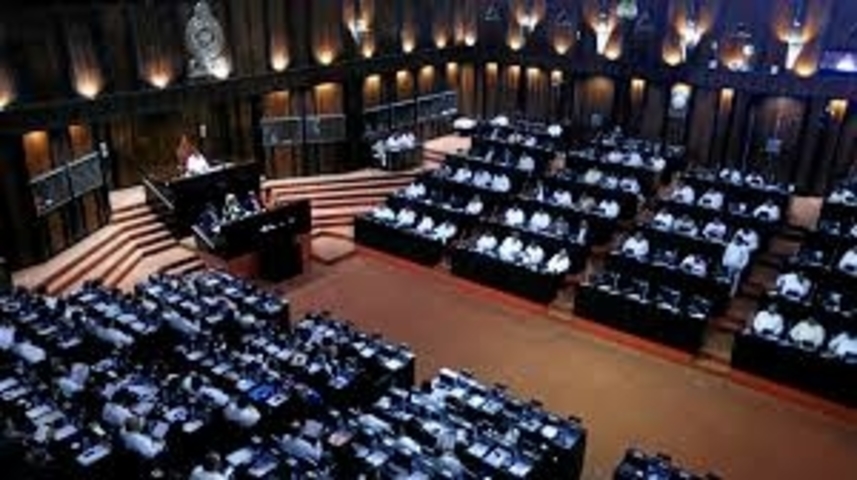
Provincial councils & local government bodies get bigger allocation than defence
The highest sum of monies in the Vote on Account (VoA) for the next four months has been allocated to the Administrative Services, Local Government and Provincial Councils Ministry, it is learnt.
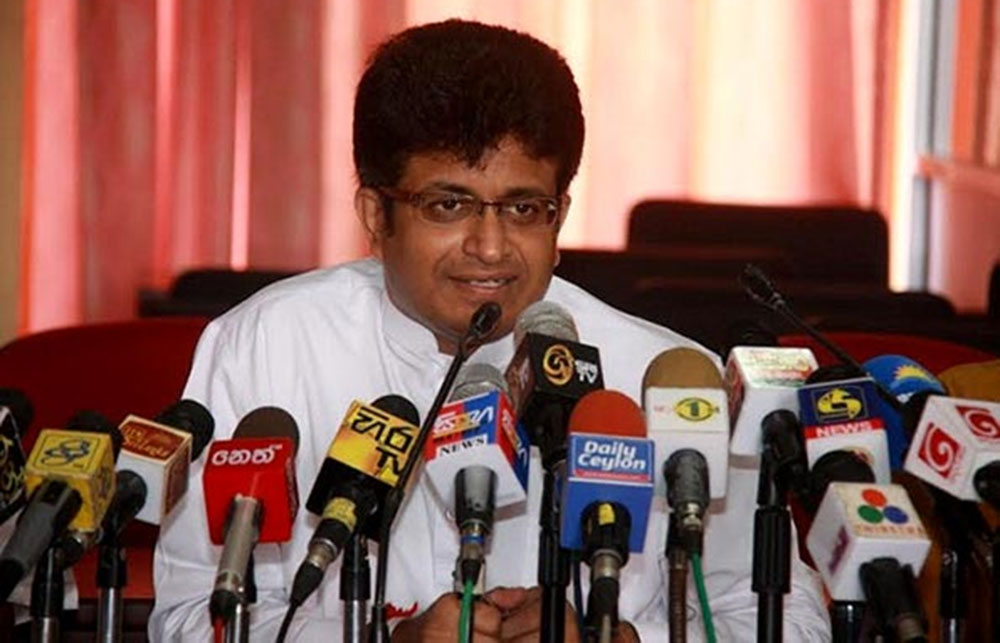
We were wrong about Ranil for 25 years: Udaya Gammanpila
SLPP Colombo district candidate Udaya Gammanpila says that they were wrong to accuse former Prime Minister Ranil Wickremesinghe of favouring separatism.
"Up until now, we have been accusing Ranil Wickremesinghe of being in favour of separatism. We accused him of trying to destroy the United National Party by appeasing to the Tamil seperatists and to the Muslim extremists. We made this serious allegation for more than 25 years," Gammanpila said at a press briefing today (30).
He said that with the split that resulted in the UNP, they have been able to ponder who really pandered to the separatists and the extremists.
"Now when we look back, it was wrong to accuse him. Although we saw that Muslim extremists and Tamil seperatists like MA Sumanthiran were aligned with the UNP, they have actually been with Sajith Premadasa and not with Ranil Wickremesinghe. Only when these two split did we get to see whose side Hakeem, Mano, Digamabaram and the likes of Sumanthiran were on," he said.
Page 242 of 510